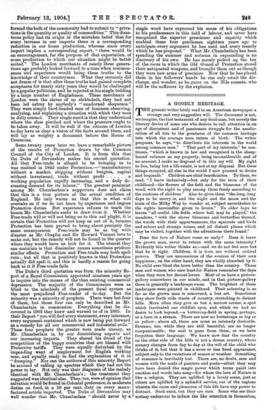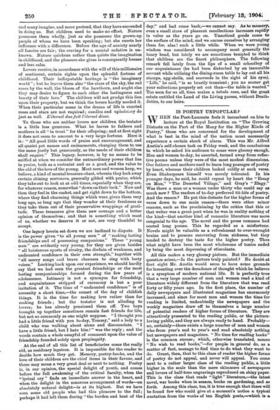A GOODLY HERITAGE. T HE present writer lately read in an
American newspaper a strange and very suggestive will. The document is not, we imagine, the last testament of any dead man, but merely the literary device of some one who desires to call attention in an age of discontent and of passionate struggle for the amelio- ration of all lots to the greatness of the common heritage into which the average man enters at birth. The writer purposes, he says, "to distribute his interests in the world among common men." "That part of my interests," he con- tinues, "which is known in law and recognised in the sheep- bound volumes as my property, being inconsiderable and of no account, I make no disposal of in this my will. My right to live, being but a life estate, is not at my disposal. But these things excepted, all else in the world I now proceed to devise and bequeath." Children are chief beneficiaries. To them, we read, "I leave inclusively—but only for the term of their childhood—the flowers of the field and the blossoms of the wood, with the right to play among them freely according to the customs of children." Also he gives them "the long, long days to be merry in, and the night and the moon and the train of the Milky Way to wonder at, subject nevertheless to the rights hereinafter given to lovers." To older boys he leaves "all useful idle fields where ball may be played," the meadows, "with the clover blossoms and butterflies thereof, the woods with their appurtenances, the squirrels and birds and echoes and strange noises, and all distant places which may be visited, together with the adventures there found."
Does the love of Nature come so early ? Does it leave the grown man, never to return with the same intensity P Evidently this writer thinks so,—and we do not feel sure but that he is right. Children, it is true, are without critical powers. They are unconscious of the sources of their own happiness ; on the other hand, they are wholly absorbed by it. No child ever liked the town better than the country. Those men and women who care least for Nature remember the days when they were her devout lovers. Most of us have a picture. gallery somewhere in our minds, and in that picture-gallery there is generally a landscape-room. The brightest of these landscapes were painted in childhood. Their colouring is, so far as the grown man is concerned, a lost art. Sometimes they show forth wide tracts of country, stretching to distant hills. More often they give us but a narrow corner, a spot which fascinated our childish eyes, and which we had no desire to look beyond,—a buttercup-field in spring, perhaps, or a turn in a stream. There are now no buttercups so big or so yellow ; above all, there are none so intensely desirable. Streams, too, while they are still beautiful, are no longer companionable; the soul is gone from them, or we have forgotten their language. We know now that the country on the other side of the hills is not a dream country, whose scenery changes from day to day at the will of the child who thinks of it, but that it has a more or less fixed appearance, subject only to the variations of season or weather. Something of romance is inevitably lost. There are, no doubt, men and women with the souls of painters and poets—albeit they may have been denied the magic power which turns paint into emotion and words into song—for whom the love of Nature is like a religion. They are uplifted by a lovely scene, just as others are uplifted by a splendid service, out of the regions wherein the cares and pleasures of this life have any power to distract. Such exist, but they are rare. Some who see their ecstasy endeavour to induce the like sensation in themselves,
and many imagine, and more pretend, that they have succeeded in doing so. But children need to make no effort. Nature possesses them wholly, just as she possesses the grown-up people of whom we have been speaking; but she exerts her influence with a difference. Before the age of anxiety nearly all fancies are fair; the craving for a mental sedative is un- known. Nature quickens rather than quiets the imagination in childhood, and the pleasure she gives is consequently keener and less calm.
Lovers receive, in accordance with the will of this millionaire of sentiment, certain rights upon the splendid fortune of childhood. Their indisputable heritage is "the imaginary world "; but he leaves them also " the stars of the sky, the red roses by the wall, the bloom of the hawthorn, and aught else they may desire to figure to each other the lastingness and beauty of their love." The children will not grudge this lien upon their property, but we think the lovers hardly needed it.
When their particular scene in the drama of life is enacted roses and stars are not required ; candles and upholstery do just as well. L'eternel duo fait l'eternel decor.
To those who are neither lovers nor children the testator is a little less generous. What he leaves to fathers and mothers is all "in trust" for their offspring; and at first sight it does not seem to amount to a very large fortune. Here it is : "All good little words of praise and encouragement, and all quaint pet names and endearments, charging them to use the same justly but generously, as the needs of their children shall require." This legacy, however, is by no means to be sniffed at when we consider the extraordinary power that lies in praise, both as a restraint and as a goad, and the value to the old of the love of the young. Most men and women keep, we believe, a kind of mental treasure-chest, wherein they lock away certain shining sentences, generally gilded with praise, which they take out to look at at odd times, especially when they are, for whatever reason, somewhat "down on their luck." Now and then they feel in the casket, and get right down to the bottom, where they find charming things which were given them very long ago, so long ago that they wonder at their freshness as they take them out of their preservative wrappings of grati- tude. These treasures give them new courage and a better opinion of themselves ; and that is something which most of us, whether we deserve it or not, are very thankful to accept.
One legacy herein set down we are inclined to dispute. It is the power given "to all young men" of "making lasting friendships and of possessing companions." These "young men" are evidently very young, for they are given besides " all boisterous sports of rivalry, the disdain of weakness, and undaunted confidence in their own strength," together with "all merry songs and brave choruses to sing with lusty voices." Looking back upon our experience, we should hardly say that we had seen the greatest friendships or the most lasting companionships formed during the few years of adolescence. Intimacy is not a synonym for friendship, and acquaintance stripped of ceremony is but a poor imitation of it. The time of "undaunted confidence" is of necessity a short time,—the sunset of the day of childish things. It is the time for making love rather than for making friends ; but the testator is not alluding to lovers ; he has already pensioned them off. Two boys brought up together sometimes remain fast friends for life, but not so commonly as one might suppose. "I thought you had a little friend with you to-day, Tommy," said a lady to a
child who was walking about alone and disconsolate. "I have a little friend, but I hate him ! " was the reply ; and the words contain a whole essayful of comment upon the value of friendship founded solely upon propinquity.
At the end of all this list of beneficiaries come the really old, as residuary legatees. It is impossible for the reader to
decide how much they get. Memory, poetry-books, and the love of their children are the chief items in their favour, and these may mean a very great deal or next to nothing. Poetry is, in our opinion, the special delight of youth, and comes before the full awakening of the critical faculty, when the "lyrical cry" finds an immediate answer in the heart, and when the delight in the sonorous arrangement of words—an absolutely natural delight—is at its highest. But we have seen some old people who had this pleasure to the full; perhaps it had left them during "the burden and heat of the day," and had come back,—we cannot say. As to memory, even a small store of pleasant recollections increases rapidly' in value as the years go on. Unnoticed goods come to the surface of the mind, and we amuse ourselves by arranging them for, alas ! such a little while. When we were young wisdom was considered to accompany most generally the hoary head, but lately we are sometimes tempted to think that children are the finest philosophers. The following remark fell lately from the lips of a small schoolboy of our acquaintance (he had been disturbed by an inexorable servant while utilising the dining-room table to lay out all his stamps, egg-shells, and seaweeds in the sight of his eyes). "Life," he said, "is so beastly transient ; you no sooner get your collections properly set out than—the table is wanted." Too soon for us all, time makes a tabula rasa, and the great estate entitled the Land of the Living passes, without Death- duties, to our heirs.







































 Previous page
Previous page